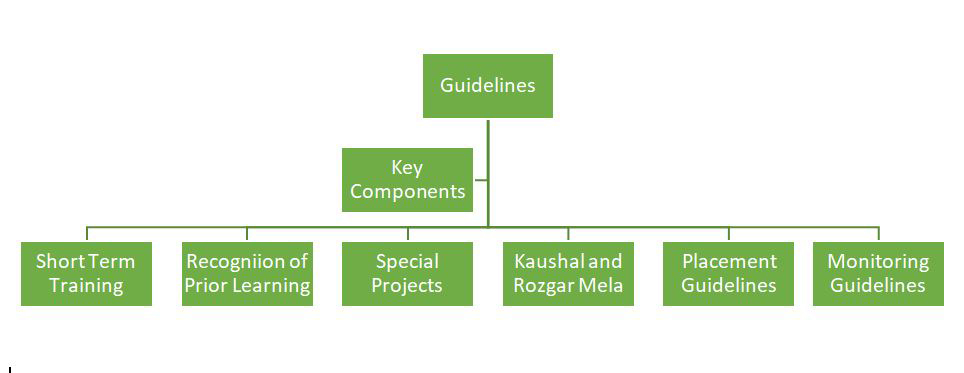 Introduction
Introduction
- On [latex]{20}^{th}[/latex]March 2015, Government of India approved the largest Skill Certification Scheme in India.
- Subsequently, on the occasion of World Youth Skills Day, [latex]{15}^{th}[/latex]July 2015, the Ministry of Skill Development and Entrepreneurship (MSDE) and Honorable Prime Minister, Shri Narendra Modi, launched this flagship scheme for skill training of the Indian youth.
- The Scheme has been named as Pradhan Mantri Kaushal Vikas Yojna and is often referred to as PMKVY. The Ministry has allocated a budget of INR 12,000 crores for successful implementation of the Scheme.
- PMKVY has been implemented through the National Skill Development Corporation or NSDC.
- The scheme was approved for another four years as it was successful in the first year of implementation. During these four years (2016 to 2020), the Scheme has been successful in covering around 10 million young Indians.
- For all other information, visit the website: http://pmkvyofficial.org/.
 PMKVY
PMKVY
- The Prime Minister of India launched the Scheme with the main motto of 'Let's make India the Skill Capital of the World'.
- Skill training is provided to the candidates based on the National Skill Qualification Framework (NSQF) and the standards set by the industry.
- With the effect of this Scheme, the Government shall bear the Training and Assessment fee of all the candidates.
- Moreover, individuals who have a prior learning experience and skills are also assessed and certified under the Recognition of Prior Learning (RPL).
PMKVY is a skill certification scheme that aims to enable Indian youth to take up skill training that is industry relevant. This training shall help them secure a better livelihood.
The objective of the PMKVY claim that the Scheme applies to candidates with Indian nationality who may be:
- A college or a school drop out
- An unemployed youth.
- MSDE has issued Guidelines for the successful implementation of PMKVY. These guidelines were formulated so that the participating agencies abide by them.
- The Guidelines have been approved by the PMKVY’s Steering Committee and came into effect since [latex]{15}^{th}[/latex]July 2016.
Given below are the six key components mentioned in the Guidelines.
1. Short Term Training: The PMKVY Training Centers (TCs) are expected to benefit the eligible beneficiaries by providing them with the training according to the NSQF level 5 and below.
- TCs shall impart training in the fields of Financial and Digital Literacy, Entrepreneurship, and Soft Skills.
- The duration of the training provided in the TCs ranges between 150 to 300 hours and shall vary as per the job role.
- Once the candidates have successfully completed the assessment, they shall be provided placement assistance by the Training Partners (TPs).
- RPL aims to arrange the competencies of the unregulated workforce that exists in India to the NSOF.
- MSDE and NSDC have designated and incentivized Project Implementing Agencies (PIAs) like Sector Skill Councils (SSCs) to implement RPL projects in any three project Types (i.e., RPL Camps, RPL centers, and RPL Employers Premises).
- Further, PIAs can offer Bridge courses to fill the knowledge gaps of RPL candidates.
- Specific areas can be premises of Government bodies, Corporates and Industry bodies, and training in Special jobs that are not defined by National Occupational Standards (NOS).
- Special projects are the ones that require some deviation from the terms and conditions defined for the Short Term Training for any stakeholder.
- PMKVY assigns importance of the involvement of target beneficiaries through a defined mobilization process to ensure transparency and accountability.
- TPs can conduct Kaushal and Rozgar Mela once in every six months with media coverage.
- PMKVY TCs make every effort to provide placement opportunities to candidates who have been trained and certifies under this Scheme.
- TPs are also responsible for providing support for entrepreneurship development.
- Methodologies like call validations, self-audit reporting, surprise visits are also followed.
- Monitoring through the Skills Development Management System (SDMS) enhances the engagement of the latest technologies.
- In addition to the NSDC, the PMKVY scheme uses the Central and State Government affiliated TPs to implement training.
- Before being eligible to participate in the Scheme, all TPs have to be registered on the SMART portal.
- Training generally includes personal grooming, soft skills, behavioral change for cleanliness, and good work ethics.
- SSCs and the State Governments are responsible for closely monitoring the skill training happening under the PMKVY.
| Short Form | Full Form |
|---|---|
| PMKVY | Pradhan Mantri Kaushal Vikas Yojna |
| NSDC | National Skill Development Corporation |
| NSQF | National Skill Qualification Framework |
| RPL | Recognition of Prior Learning |
| MSDE | Ministry of Skill Development and Entrepreneurship |
| TCs | Training Centers |
| TPs | Training Partners |
| PIAs | Project Implementing Agencies |
| SSCs | Sector Skill Councils |
| NOS | National Occupational Standards |
| SDMS | Skills Development Management System |




